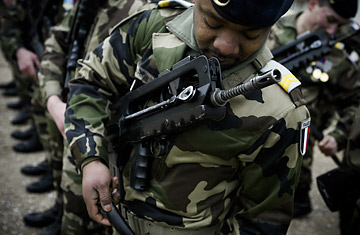
French soldiers attend a change of command ceremony of the NATO-led peacekeeping Kosovo Force
There's nothing new about Washington asking its European allies to start pulling their military weight. But when American Defense Secretary Robert Gates appealed for additional European troop support for the war in Afghanistan on Thursday, the sense of futility was all too obvious. Even as Gates asked Europe for help, he let on that he doesn't actually expect much. President Barack Obama's White House "is a new administration and there clearly will be expectations that the allies must do more," Gates said Thursday during a trip to Poland, his first abroad since being retained as Defense Secretary after the handover from President Bush to Obama. But, he added, "I think the likelihood of getting the allies to commit significant numbers of additional troops is not very great."
Gates' pessimism is born of longstanding U.S. frustration over Europe's commitment to NATO military and peacekeeping operations. So news that France plans to return to NATO's integrated military command ahead of or during 60th anniversary celebrations for the alliance on April 4 could, at first glance, be taken as a sign that change is in the air. President Nicolas Sarkozy's long-standing reintegration plan would reverse President Charles de Gaulle's decision 43 years ago to pull France from NATO's military and planning structure to protest what he felt was Anglo-American domination of the organization. Since de Gaulle, France has staked out independent and, at times, contrarian defense and diplomatic positions. (See pictures of France celebrating Bastille Day.)
When necessary, Sarkozy says France will continue to oppose the U.S. on issues like the Iraq war, international finance, and environmental protection. But mutual objectives are so generally in line now, he argues, that France's exceptional status in NATO has become nonsensical. "You can be sure that by the month of April we will try to realize the great ambition for this family that we are part of," Sarkozy told an international security summit in Germany last month. "The alliance with the United States and the alliance with Europe does not compromise the independence of my country."
But will France's return actually mean much for NATO and its members? Is France likely to send thousands more troops to Afghanistan? Not really, and no. French activity in NATO has grown broader and deeper over the past few years already. France participated in a growing number of alliance-led missions including Bosnia, Kosovo and Afghanistan. Those operations erased most of the significant divisions created by de Gaulle's partial withdrawal in 1966, and rendered France's special status largely symbolic. (See pictures of Kosovo.)
So why is France returning? "Although it already plays an active role within NATO in its present status, full membership would allow it both to fully participate in and shape the planning of NATO's future, as well as its military operations," says Bruno Tertrais, senior research fellow at the French Foundation for Strategic Research in Paris. "That bigger role would correspond better to France's international stature, as well as its status as one of Europe's largest contributors to NATO."
French officials also hope they will take charge of two important NATO outfits: one in Norfolk, Virginia, which oversees alliance reform; and an operational command center in Lisbon, Portugal. Hundreds of French officers will also assume posts in NATO institutions, including its headquarters in Brussels. Tertrais says France also wants to reassure Washington and certain E.U. capitals that France's plans to strengthen Europe's own defense can help the NATO alliance rather than undermine it. "France needs to put an end to questions in the minds of certain allies about whether its desire to construct a European defense identity is in part designed to weaken NATO," Tertrais says. "Total reintegration into NATO would not only alleviate these suspicions, but also bring France's evolution even with other European Union nation members in NATO. Since it was created in 1992, one important aspect of European evolution has been the increasing convergence of the E.U. and NATO."
Sarkozy is confident the French public will see France's return to NATO as both logical and inevitable. "By keeping one foot out," Tertrais says, "France risks in some ways being on the wrong side of history." Gates and others may ask, however, how getting on the right side of history is useful if Europe won't follow through with sufficient troops when alliance forces go into action.
